Mekong News - Archive
January - March 2006
Issue 2006/1
In this issue:
- International IWRM Forum shares lessons from experts around world
- Council calls for more development in basin
- FMMP swings into action at new flood centre
- Fisheries gains US$5 million support from Denmark
- Belgium supports MRC Navigation Programme
- Tonle Sap study hones in on flood pulse
- Basin planning courses ready to roll
- Record attendance at fisheries symposium
- Workshops and events
International IWRM Forum shares lessons from experts around world
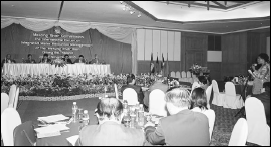
Participants had plenty of chances
to listen and
later discuss issues raised.
Around 180 regional and international participants gathered in Chiang Rai, Thailand in November for the MRC's International Forum on Integrated Water Resources Management in the Mekong River Basin.
The forum, which was held partly to celebrate the MRC's 10th anniversary, discussed the issues facing the application of IWRM in the sustainable development of the Mekong River Basin and attempted to identify suitable actions to be considered for this implementation to be successful. The forum was supported by AusAID, GTZ, SENSAand SIDA and organised by the MRC Secretariat and the Thai National Mekong Committee.
The forum was officially opened by the Thai Vice Minister of Education H.E. Mr Limskul Kitti. Dr Olivier Cogels, Chief Executive officer of the MRCS and H.E. Mr Somphong Mongkhonvilay, MRC Council Member for Lao PDR also gave speeches. Special addresses were made by H.E. Dr Krit Kraichitti, Thai ambassador to Viet Nam, who was part of the negotiation team which drafted the 1995 Agreement and Mr Les Roberts, General Manager Natural Resources Murray Darling Basin Commission.
The forum featured four themed sessions each with several presentations and time for questions and discussion. The themes were tied to the four pillars of the MRC's new Strategic Plan 2006-2010: Meeting Development Needs, Strengthening Cooperation, Maintaining Ecological Balance and Building Capacity.
Papers and presentations were made by regional and international experts, representatives of overseas and regional river basin organisations, MRC partners and research groups.
One key message arising from the forum was that if development is to be successful and helpful to the basin's people it must be through coordinated development. Sustainable development and integrated water management must still be subject to cooperation between the parties concerned, be they users or riparian states.
Forum participants heard that the complexity of water resource development and management in the Lower Mekong Basin requires a shared set of goals and the need to take into account common priorities, such as the identification of synergies between proposed national projects, combining projects into joint and/or cross-sectoral programs and identifying an agreed set of indicators to assess trade-offs between sectors.
The navigation sector was an area singled out as one in urgent need of coordinated development and the introductin of common safety rules and environmental safeguards to ensure social and economic benefits of development.
There were calls for changes in planning at all levels in each member country in order to meet their own needs without compromising the capacity of future generations to meet their own. Participants also said increased cooperation with China and better knowledge of the Mekong River's flow regimes were required in order to promote development.
The National River Basin Organisations have a key role to play at the regional level, but there is a need for closer communication and collaboration between riparian countries, promotion of data and information sharing and development of common basin development and management schemes through an integrated approach. There is also a need for an organisational structure at the nationwide basin level as well as sub basin level, coordinating with other regional initiatives.
When the discussion turned to capacity building it was noted that participatory water governance, takeholder participation and management at the lowest appropriate level have implications for institutional arrangements, roles and responsibilities. For IWRM to be implemented at the basin level, stakeholders need to be incorporated into the decision-making process, supported by the requisite capacity and systems. Local experience is one key to successful capacity building.
The eco-systems that sustain water resources must be protected in order to satisfy and reconcile human water needs.
Environmental Flows can be a useful tool for IWRM and water-related negotiations and their role as a component of water governance is important if ecosystem and livelihoods agendas are to be factored into IWRM processes.
The forum participants suggested that, with the new economic corridors opening up in this region, there was a need to examine cumulative impacts, economic costs and benefits of such infrastructure as roads and hydropower dams and make concrete recommendations to mitigate any negative outcomes.
It was also proposed that an integrated river basin approach to planning in the basin could be used as a conservation tool within the development sphere. WWF and MRC are now producing materials that can be used as decision-making tools when considering development options and MRC has a useful role to play in providing relevant research data.
Participants were also encouraged to take a new look at how natural ecosystems can be enhanced to become development options.
“It was a productive and stimulating forum,” Dr Cogels said. “We have gathered some useful knowledge on the challenges facing implementation of IWRM in the Mekong River Basin and how it might best be managed to achieve sustainable development outcomes.”
Council calls for more development in basin
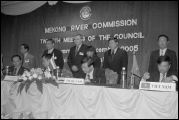
Council members sign the
minutes of the meeting.
MRC Council members are looking forward to seeing more concrete
and tangible outputs from the Basin Development Plan and say
that the
MRC’s Strategic Plan 2006-2010 reflects the real needs
and aspirations of MRC countries and that investment in the
projects identified by the BDP will show the people of the basin
the real value of the MRC.
The Ministers from the four member countries met at the 12th Meeting of the MRC Council in Chiang Rai, Thailand on 29-30th November 2005. At the meeting they expressed their satisfaction with the work achieved by the MRC and the MRC Secretariat in the past 10 years.
The region faced floods, droughts and the rapid development of the hydropower sector, but the MRC has successfully been transformed into a hub for information and regional cooperation, in contrast to the previous regional operation which focused on safeguarding national interests. The Council Members said this spirit of cooperation would be the way to find joint solutions to sustainable development needs in the next decade.
All countries expressed their desire to include the MRC’s upstream neighbours and dialogue partners China and Myanmar in long term plans.
During the meeting the Council approved the MRC’s 2006 Work Programme, the 2006 Operating Expense Budget and the 2006-2010 Strategic Plan as a document still open for further donor input. They also approved important BDP documents and Phase 2 of the Fisheries Programme.
The BDP Strategic Direction of Integrated Water Resources Management in the Lower Mekong Basin sets out strategic directions for development of water resources in the LMB for the next 20 years and aims to synthesise directions identified in national plans and strategies and add a basin dimension. It spells out the concepts, principles, practices and guidelines that constitute good IWRM and explains why it is important for such concepts and guidelines to drive the next phase of Mekong basin water resources development.
One of the main achievements of BDP phase 1 has been the formulatin of the first list of development projects which have been agreed on by all members. These projects will form the first concrete steps in instigating the MRC’s Mekong Programme for Sustainable Development of Water and Related Resources in the Mekong Basin.
The Fisheries Programme is ready to move into Phase 2 with
substantial support from Danida funding. During this next five-year
phase it will concentrate on four areas of work: Fisheries ecology,
valuation and
migration; fisheries management and governance and aquaculture
of indigenous Mekong fish species.
The 2006 MRC work programme will introduce a Drought Management Programme and an Information and Knowledge Management Programme to the MRC structure.
Council heard that the work programme was well supported by donors. The MRC now has 37 multiyear ongoing agreements with donors from Australia, Belgium, Canada, Denmark, Finland, France, Germany, Japan, the Netherlands, New Zealand, Sweden, Switzerland, the US, the ADB, CGIAR, the EC, UNDP and the World Bank. Funds for MRC programmes in 2006 amounted to US$16.2 million. The Council members expressed their thanks for this continued support.
FMMP swings into action at new flood centre
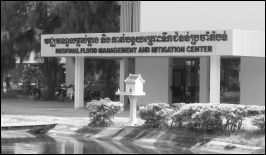
Programm work is well under way at
the RFMMC
in Phnom Penh
The MRC’s interim Regional Flood Management and Mitigation Centre (RFMMC) officially opened in mid- August, and its work is now under way. Some flood forecasting work started prior to the opening.
The RFMMC’s first task has been to hire staff. Currently, there are 16 staff on board and recruitment of component managers, programme officers, experts, and support staff is expected to be well in hand by February 2006.
The Centre is now also in the process of installing regional network system for financial management and communication links between the MRC Secretariat and the Centre.
According to Flood Management and Mitigation Programme (FMMP) Coordinator RFMMC Dr. Truong Hong Tien, initiation of the FMMP implementation is on track.
An FMMP Programme Implementation Plan (PIP) has been developed and consultations have occurred at national and regional levels to agree on the programme concept, institution arrangement, staffing, planning, monitoring and evaluation, and reporting. The PIP will provide the basic framework for implementation, including systems for coordination and decision-making, financial and administrative procedures, and will guide staff on how to implement the programme.
The centre produced a daily flood forecast for the Mekong mainstream from June 2005 through to the end of October 2005, taking data from a series of 44 monitoring stations stretching from Northern Thailand to the Mekong Delta. China, one of MRC’s Dialogue Partners, also provided daily hydrological information from two stations in its southern province of Yunnan during the flood season.
Two projects under Component 4 – (Flood Emergency Management Strengthening) are in operation. The implementation of a project funded by USAID-OFDA: “Provision of Early Warning to the Flood-Vulnerable Communities in the LMB, Phase 1 in Cambodia and Lao PDR” is now in its third year of implementation after its integration into the FMMP-RFMM Centre.
An ECHO-funded project entitled “Capacity Building for Planning and Implementation of Flood Preparedness Programme at Provincial and District Levels in the Lower Mekong Basin (Phase II)” is being carried out in partnership with the Asian Disaster Preparedness Centre.
The Danida-funded project to support FMMP Coordination will start soon and will help harmonise coordination between the components of FMMP as well as between FMMP and other MRC programmes, donors, partners and line agencies.
In the next six months the RFMMC anticipates developing a Road Map for improving systems and capabilities of the RFMMC for short, medium and long term basin wide forecasting functions, aimed at exchanging more reliable information with the four riparian countries at higher speeds.
It will also produce the 2005 Flood Report – the first of the programme’s annual reports on the impact of flooding in the Lower Mekong Basin.
Component 5 – Land Management – will move to the RFFMC in early 2006 and start implementation.
In May 2006 the Centre will organise the 4th Annual Mekong Flood Forum around the theme “Improved Flood Forecasting and Warning System for Flood Management and Mitigation in the LMB”.
Fisheries gains US$5 million support from Denmark
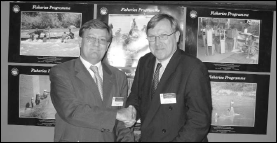
H.E. Mr Peter Lysholt Hansen and Dr
Olivier Cogels
shake hands after the signing.
The Government of Denmark, through its aid arm Danida, will provide 30 million Danish kroner (approximately US$5 million) to fund the first three years of the second phase of the Mekong River Commission Fisheries Programme.
The new funding agreement was signed by H.E. Mr Peter Lysholt Hansen, Ambassador, Royal Danish Embassy in Hanoi, and MRC Chief Executive Officer Dr Olivier Cogels at the conclusion of the 10th Donor Consultative Group Meeting held in Chiang Rai, Thailand.
The funding will be spread over the years 2006-2008 and represents a continuation of the solid support Danida has given the MRC Fisheries Programme in the past.
The MRC Fisheries Programme aims to manage the productive Mekong fisheries so as to sustain their high yield and economic output well into the future. The programme undertakes research into capture fisheries, trains fisheries managers, promotes aquaculture of indigenous Mekong fish species and disseminates information to policy makers and planners in the four Lower Mekong countries. It has been operating since the MRC was formed in 1995 and has developed a wide range of programme activities throughout the four member countries.
“The Mekong River Basin has the largest inland fishery in the world and is the single most important means of food and livelihood for millions of the poorest people in the basin,” Dr Cogels said. “It is essential that this resource is maintained and monitored carefully if we are to secure its future diversity and abundance. If we can develop ways of improving yields, through better systems and use of aquaculture we will be able to improve food security and alleviate poverty.”
He applauded the Danish Government for its generous support of this very important programme, saying that it showed the value the international donor community placed on the work being done by the Mekong River Commission.
Belgium supports MRC Navigation Programme
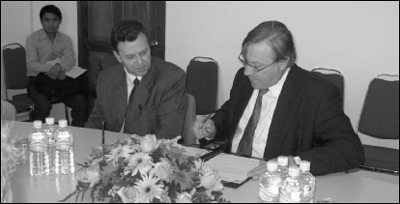
Mr Alfred Fickers and Dr Olivier Cogels
finalise the navigation funding
agreement.
In October 2005 the Mekong River Commission signed an agreement with the Government of Belgium for the provision of a one million Euros (around US$1.2 million) contribution for implementation of the MRC Navigation Programme (NAP).
This initial funding agreement for one year is the first step in a larger funding agreement of 5 million Euro over five years through the Belgian Government's Federal Public Service Foreign Affairs Directorate- General for Development Cooperation.
The agreement was formalised by Mr Alfred Fickers, Attaché Development Coordination, the Embassy of Belgium in Hanoi, and Dr Olivier Cogels on Wednesday 5 October at the MRC Secretariat in Vientiane.
The NAP is now in the first stages of implementation with the ultimate goal of promoting freedom of navigation on the Mekong in order to increase social development and international trade opportunities using the navigation potential of the river system. It will seek to balance the demand for expanded use of the river with environmental needs.
The NAP is currently involved in the start up of the Design of the Master Plan for Waterborne Transport on the Mekong River System in Cambodia, which is funded under bilateral cooperation by Belgium.
Dr Cogels said that the MRC was very grateful to the Government of Belgium for its generous support of the Navigation Programme - a programme which would be of enormous benefit to the millions of people living in the Mekong River Basin.
Mr Fickers said the funding agreement demonstrated the trust the Belgian government had in the MRC and its work.
“This agreement emphasises the importance of the MRC's role in the region as a stabilising factor helping the economies of the countries. It is important for us that our support comes in the framework of regional cooperation,” he said.
Tonle Sap study hones in on flood pulse
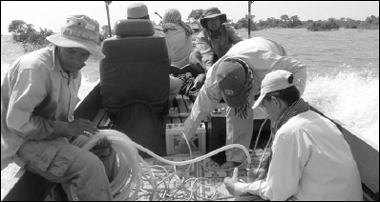
Mr Say (on right) conducts his water
testing experiments on the
Great Lake.
A Cambodian PhD student, whose fieldwork is supported by the MRC Environment Programme, is studying the influence of the prolonged seasonal Mekong flood pulse on carbon dynamics in the Tonle Sap Great Lake. Mr Say, who is studying at Monash University in Australia, is also examining the contribution of different carbon sources to key commercial fish species.
“From an ecological point of view, it is important to assess the activity of various types of primary producers that form the basis of aquatic food chains and to investigate their responses in relation to ecological and hydrological changes in the Great Lake,” he explains. “Understanding the relationships between carbon sources and the productivity of the fishery is of great importance to both the local economy and environmental management agencies.”
The hydrological regime of this floodplain lake is highly dependent upon the size of the annual flow cycle of the Mekong River, which is in turn dependent upon the variability of the south-west monsoon. Consequently, the lake and its floodplain ecology and economy are extremely sensitive to variations in monsoon behaviour.
Because so many people depend on the lake for their existence, it is important to understand the ecological processes and factors that drive high productivities. It has also been asserted that the lake’s productivity is generally attributed to the long-lasting flood cycle and the vegetation of the floodplain.
Mr Say’s study is intended to determine the influence of the seasonal flood pulse on the distribution and availability of various carbon sources to the productivity of the fishery. He will examine how much area is flooded and for how long, then work out the relationship between these factors and the amount of carbon getting to the fish and the corresponding catch sizes.
The Environment Programme says this data will be useful to feed into its environmental flow assessment work and will help determine if changes in the flood pulse system will have a significant impact on the lake’s ecological health.
Basin planning courses ready to roll
The BDP team, in conjunction with the MRC’s human resources section and AusAID, launched the first pilot course of a series of training courses on Integrated River Basin Planning in November 2005.
Five Junior Riparian Professionals currently engaged at the MRC Secretariat took part in the five-day technical course, along with several riparian staff members.
The aim of these training courses, developed by the Murray Darling Basin Commission and the BDP team, will be to improve integrated river basin planning knowledge and skills of members of river basin organizations involved in formulating a Mekong River Basin Development Plan. According to the organising team there are five main objectives:
• To understand and appreciate why basin planning is important for the sustainable development of the shared resources of the Mekong River Basin. .. To understand the major issues in basin planning for the basin.
• To understand the principles and practices of good basin planning and apply those principles to the basin.
• To understand the role of basin planners and identify core competencies for the basin planners.
• To understand the role of the Mekong River Commission and gain an appreciation of some of the tools and information that the MRC can provide to assist in basin planning.
The training modules have two levels. Level one is a one-day course for high level policy makers who cannot spare much time for training and might include such attendees as BDP sub-committee members, river basin organisation chairs and provincial governors and deputies.
Level 2 (the pilot course) provides a technical overview and detailed information for planners and managers from government agencies, river basin organisations, non-government organisations, university students, MRC professional staff and junior riparian staff. This is a seven-day course including a field trip. Organisers say the course combines river basin planning theory which is integrated into practice.
Pilot course participants offered a positive response, saying the course was effective and dealt with important issues.
The courses will now be launched in the National Mekong Committees as soon as possible.
Record attendance at fisheries symposium
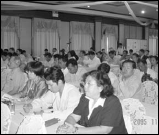
The MRC Fisheries Programme held its 7th Technical Symposium on Mekong Fisheries from 15-17th November in Ubon Ratchathani, Thailand.
This symposium provides a forum where professionals from across the region can meet to discuss recent developments in fisheries science and technology. It also provides young scientists in counterpart agencies with an opportunity to present their research to an international audience.
This year's meeting attracted a record audience of over 150 fisheries scientists from countries as far afield as Australia and Norway. The programme contained 26 oral presentations and 37 poster displays on subjects as diverse as fish yields on floodplains, gender in fisheries management and the economics of small-scale aquaculture.
The programme also included a workshop on the management of Mekong deep pools for fisheries, promoted by the TAB (Technical Body for Fisheries Management). Participants from the MRC member countries considered ways to increase knowledge of the ecology and fish productivity of the pools and to improve the management of fisheries in these important habitats.
Attendees also visited the Pak Num Fisheries Conservation Unit and the Pha Taem National Park where they saw 4,000-year-old rock paintings of fishing activities.
The Fisheries Programme will publish a volume of papers from the symposium in mid-2006.
Workshops and events
2nd NARBO General Meeting
14-18 February 2006. Bandung, Indonesia
Contact: masahiro_sugiura@water.go.jp
Tel: +81-48-600-6553
Fax: +81-48-600-6550
4th World Water Forum
16-22 March 2006. Mexico City, Mexico
Including The 1st International 'Water and Film' Event
http://www.worldwaterforum4.org.mx
23rd MRC Joint Committee Meeting
April 2006. Vientiane, Lao PDR
Contact: schiefer@mrcmekong.org
Fourth Annual Mekong Flood Forum
18-19 May 2006. Phnom Penh, Cambodia
Contact: tien@mrcmekong.org
International Conference on Rivers and
Civilisation: Multidisciplinary Perspectives on Major River
Basins
25-28 June 2006. La Crosse, Wisconsin, US
http://www.unesco.org/water/water_events/Detailed/1166.shtml
3rd International Symposium on Integrated
Water Resources Management
26-28 September 2006. Bochum, Germany.
Mrs Jana Radoi, Conventus Congressmanagement & Marketing
Tel: +49 3641 35 33 221,
Fax: +49 3641 35 33 271,
Contact: water@conventus.de.
Choose a newsletter:
